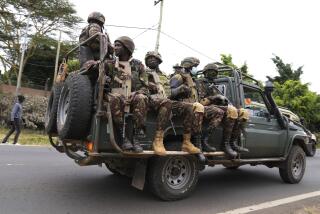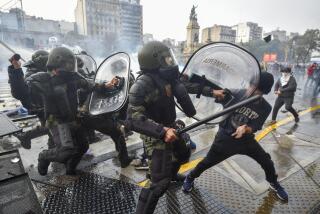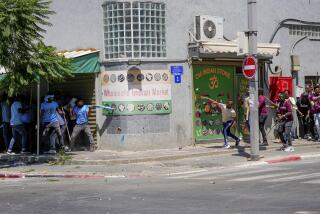Street battles erupt between Egypt’s rival political camps
CAIRO — Anger between Egypt’s rival political camps erupted into street battles Wednesday after Islamist supporters of President Mohamed Morsi tore down tents of anti-government demonstrators, raising the possibility of widening violence over the nation’s proposed constitution.
Pro-Morsi factions overran about 200 protesters camped outside the presidential palace in north Cairo. The clashes came after the Muslim Brotherhood’s Freedom and Justice Party called thousands of its members into the streets in a counter-demonstration to drive opposition movements from the presidential palace.
Shoving and punching spilled down a boulevard as hurled stones, swinging sticks and firebombs filled the dusk in one of the capital’s wealthiest neighborhoods. Pro-Morsi contingents, including Brotherhood followers and ultraconservative Salafis, chased opposition activists shouting: “God is great. The people support the president’s decision.”
More than 125 people were injured on a cityscape that had the charged air of a flourescent-lit battlefield with competing banners, bandaged men and dinner trays used as shields to block barrages of rocks.
Police were slow to react but eventually arrived and attempted to separate the two sides even as the skirmishes raised fears that animosity between Islamists and the mainly secular opposition were a dangerous foreshadowing. Both camps threatened to march against each other and there appeared little compromise in a battle over the nation’s future that symbolizes the larger struggle over political Islam rising from the Arab Spring.
“Vicious attack vs. peaceful protesters in front of presidential palace,” tweeted Mohamed ElBaradei, a Nobel Peace Prize laureate and opposition leader. “Regime leading Egypt into violence and bloodshed.”
The clashes revealed new cracks in Morsi’s government from officials disturbed by the power and meddling of the Brotherhood. Three presidential advisors resigned, including Seif Abdel-Fattah, who told the Egyptian media: “Egypt is bigger than a narrow-minded elite .... We can no longer stay silent because they [the Brotherhood] have harmed the nation and the revolution.”
Tensions began two weeks ago when Morsi, a former Brotherhood leader, issued a decree that expanded his powers and protected the Islamist-dominated constitutional assembly from judicial oversight. The country’s highest court was expected to dissolve the assembly but delegates quickly finished a draft constitution that Morsi ordered be put to a national referendum Dec. 15.
Opposition factions marched on the presidential palace Tuesday to protest Morsi’s authority and the charter, which they say would open the country to Islamic law and a scaling back of civil rights. The demonstration angered the Brotherhood, which on Saturday avoided confrontation with the opposition by holding a massive rally miles away from Tahrir Square, where anti-Morsi movements have made their base.
But the Brotherhood on Wednesday was more aggressive: “The president will not retreat, and if the state apparatus is weakened by the wounds of the previous period, then the people can impose their will and protect legitimacy,” said Essam Erian, deputy head of the Freedom and Justice Party.
ALSO:
Police actions questioned after Mexican inauguration protests
Israel moves forward with controversial West Bank development
Indian Olympic officials defy IOC, pick corruption suspect as leader
Special correspondent Gaser El Safty contributed to this report.
More to Read
Sign up for Essential California
The most important California stories and recommendations in your inbox every morning.
You may occasionally receive promotional content from the Los Angeles Times.











